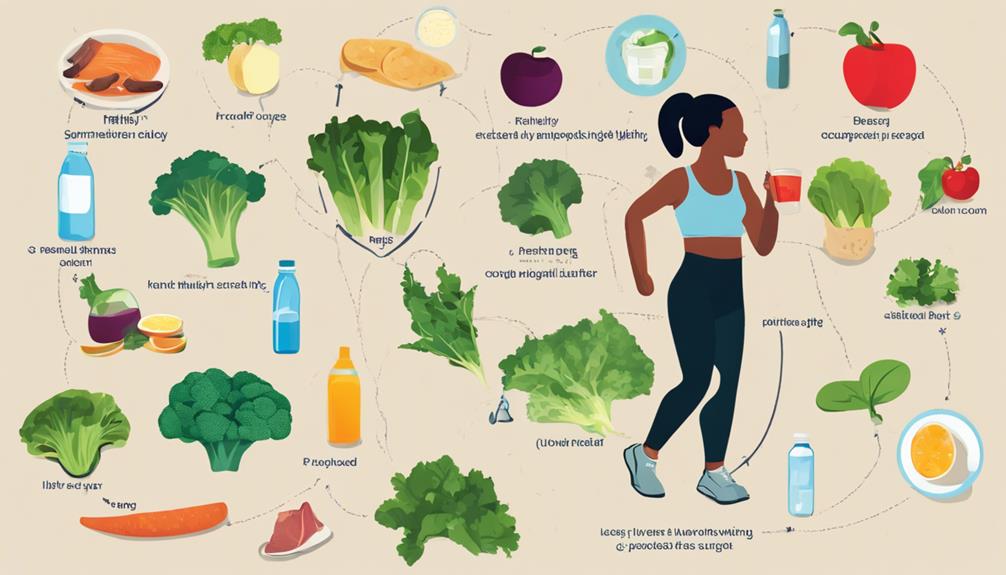How to Support a Healthy Liver
To support a healthy liver, nourish it with a balanced diet full of fruits, vegetables, whole grains, and healthy fats. But that's just the beginning. With a few key lifestyle habits, you can take your liver health to the next level. Stay tuned to learn about some simple yet effective strategies that will keep your liver in top shape for optimal well-being.
Key Takeaways
- Eat a nutrient-rich diet with fruits, vegetables, whole grains, and healthy fats.
- Stay hydrated with water, herbal teas, and fresh juices for optimal liver function.
- Engage in regular exercise like yoga, weight training, and cardio for liver health.
- Limit alcohol intake to support a healthy liver.
- Practice relaxation activities and ensure quality sleep for optimal liver function.
Importance of Liver Health
Understanding the importance of liver health is crucial for maintaining overall well-being. Your liver is a powerhouse organ responsible for vital functions like detoxification and regeneration.
Liver detoxification involves the removal of harmful substances from your body, ensuring that toxins are processed and eliminated efficiently. This process is essential for preventing the build-up of harmful compounds that could negatively impact your health.
Moreover, liver regeneration is a remarkable ability of the liver to repair and renew itself after injury or damage. This capacity allows the liver to recover from various insults, such as excessive alcohol consumption or certain medications.
Balanced Diet for Liver
A well-balanced diet plays a crucial role in supporting optimal liver function. To aid in a liver cleanse and maintain overall liver health, focus on consuming nutrient-rich foods. Start by incorporating plenty of fruits and vegetables into your meals. These foods are packed with vitamins, minerals, and antioxidants that help protect the liver from damage.
Berries, grapes, and cruciferous vegetables like broccoli and Brussels sprouts are especially beneficial.
Additionally, include whole grains in your diet, such as brown rice, quinoa, and whole wheat bread. These foods provide fiber, which aids in digestion and helps the liver function properly.
Healthy fats like those found in avocados, nuts, and olive oil also support liver health. Omega-3 fatty acids, found in fatty fish like salmon and mackerel, can reduce inflammation and promote a healthy liver.
Hydration and Liver Function
To maintain optimal liver function, adequate hydration is essential. Hydration benefits the liver by aiding in the detoxification process. Water is crucial for flushing out toxins and waste products from the body, helping the liver perform its functions efficiently.
When you're dehydrated, the liver struggles to metabolize fat effectively, leading to a buildup of toxins in the body. By staying well-hydrated, you support the liver in processing and eliminating harmful substances.
Research shows that even mild dehydration can impair liver function and hinder the detoxification process. Aim to drink at least eight 8-ounce glasses of water daily to keep your liver functioning optimally.
Additionally, herbal teas and fresh fruit juices can contribute to your daily fluid intake and provide added benefits for liver health.
Exercise and Liver Health
Staying physically active through regular exercise is crucial for maintaining optimal liver health. Here are three key ways in which exercise can benefit your liver:
- Yoga Benefits: Engaging in yoga practices not only helps in reducing stress and improving flexibility but also supports liver health. Certain yoga poses like twists can aid in detoxifying the liver, promoting better digestion, and enhancing overall liver function.
- Weight Training: Incorporating weight training into your exercise routine can be highly beneficial for your liver. Building muscle mass through weight training helps in improving insulin sensitivity, which is essential for liver health. Additionally, weight training can help in reducing liver fat and decreasing the risk of fatty liver disease.
- Cardiovascular Exercise: Activities such as running, cycling, or swimming can boost your cardiovascular health, leading to improved blood flow to the liver. This enhanced blood flow supports the liver in carrying out its functions efficiently, such as filtering toxins and producing essential proteins.
Limit Alcohol Consumption
Engaging in regular exercise like yoga, weight training, and cardiovascular activities can significantly benefit your liver health.
Another crucial aspect of liver care is alcohol moderation. Limiting alcohol consumption is essential for maintaining a healthy liver.
Alcohol is metabolized in the liver, and excessive intake can lead to inflammation, scarring, and even liver disease. To support optimal liver function, it's recommended to limit alcohol consumption to moderate levels. For men, this means up to two drinks per day, and for women, up to one drink per day.
Avoid Processed Foods
Processed foods, a common part of many modern diets, can have detrimental effects on your liver health. These foods are often high in unhealthy fats, sugars, and additives that can burden your liver and hinder its detoxification processes.
Here are three reasons why avoiding processed foods is crucial for supporting your liver health:
- Liver Detoxification: Processed foods are often loaded with artificial ingredients and preservatives that can overwhelm your liver's detoxification pathways, leading to inflammation and potential damage over time.
- Nutrient Deficiency: Many processed foods lack essential nutrients that are vital for liver health, such as antioxidants, vitamins, and minerals. Opting for whole, unprocessed foods can provide your liver with the necessary nutrients to function optimally.
- Natural Supplements: Instead of relying on processed foods, consider incorporating natural supplements like milk thistle, turmeric, or dandelion root into your diet. These supplements have been shown to support liver function and promote overall well-being. Taking this step can aid your liver in its detoxification processes and help maintain its health in the long run.
Liver-Friendly Herbs and Spices
Rich in antioxidants and beneficial compounds, liver-friendly herbs and spices play a crucial role in supporting optimal liver function. Herbal remedies have been used for centuries to aid in liver health, offering natural solutions backed by traditional wisdom and modern research. Incorporating these herbs and spices into your diet can provide a gentle yet effective way to support your liver's detoxification processes and overall well-being.
Here are some common liver-friendly herbs and spices along with their benefits:
| Herb/Spice | Benefits | Usage |
|---|---|---|
| Milk Thistle | Supports liver regeneration and repair | Herbal tea, supplements |
| Turmeric | Anti-inflammatory properties | Curries, teas, supplements |
| Dandelion | Enhances bile production | Salads, teas, supplements |
Detoxify Naturally
To naturally detoxify your liver, focus on incorporating specific foods and lifestyle habits that support its cleansing processes. The liver cleanse is vital for overall health and well-being. Here are three natural remedies to help detoxify your liver:
- Increase Your Intake of Cruciferous Vegetables: Vegetables like broccoli, cauliflower, and Brussels sprouts contain compounds that support liver detoxification enzymes. Include these in your meals to aid in the cleansing process.
- Stay Hydrated with Lemon Water: Drinking warm water with lemon in the morning can help kickstart your liver's detoxification process. Lemon water is known for its cleansing properties and can support your liver in flushing out toxins.
- Incorporate Turmeric into Your Diet: Curcumin, the active component in turmeric, has potent anti-inflammatory and antioxidant properties that can support liver health. Add turmeric to your dishes or enjoy a warm cup of turmeric tea to aid in natural liver detoxification.
Manage Stress Levels
To effectively manage stress levels for optimal liver health, implementing specific strategies is crucial. Stress management techniques play a pivotal role in supporting liver function. Chronic stress can lead to inflammation and damage to the liver over time.
Engaging in activities such as mindfulness meditation, deep breathing exercises, yoga, or even spending time in nature can help reduce stress levels and positively impact liver health.
The mind-body connection is a powerful tool when it comes to managing stress. Studies have shown that high levels of stress hormones can impair liver function and contribute to various liver diseases.
Quality Sleep for Liver
Quality sleep is vital for maintaining optimal liver function and overall health. When it comes to supporting your liver through quality sleep, consider the following:
- Sleep hygiene: Establish a relaxing bedtime routine to signal to your body that it's time to wind down. This can include activities such as reading a book, taking a warm bath, or practicing deep breathing exercises.
- Consistent sleep schedule: Aim for at least 7-9 hours of quality sleep each night. Going to bed and waking up at the same time every day helps regulate your body's internal clock, enhancing liver function.
- Liver regeneration: During sleep, the liver undergoes crucial processes of detoxification, repair, and regeneration. By ensuring you get enough restful sleep, you support these essential functions, allowing your liver to effectively cleanse your body of toxins and promote overall well-being.
Prioritizing quality sleep and incorporating good sleep practices into your routine can significantly benefit your liver health and contribute to your overall vitality.
Regular Liver Function Tests
Supporting your liver health involves regular monitoring through liver function tests. These tests help assess the health of your liver by measuring liver enzymes and other markers indicative of liver function. One important reason for these tests is to detect liver cirrhosis, a serious condition where healthy liver tissue is replaced by scar tissue, impacting liver function.
To give you a better understanding, here is a simple table outlining common liver function tests:
| Liver Function Test | What it Measures |
|---|---|
| ALT (Alanine Aminotransferase) | Levels of this enzyme rise in liver damage. |
| AST (Aspartate Aminotransferase) | Elevated levels may indicate liver injury. |
| ALP (Alkaline Phosphatase) | High levels can signal liver or bone issues. |
Regular liver function tests are crucial for early detection of liver problems, including cirrhosis. By keeping up with these tests, you can proactively monitor your liver health and take necessary steps to maintain a healthy liver.
Seek Professional Guidance
Monitoring your liver health through regular liver function tests is a fundamental step in maintaining a healthy liver. Seeking professional guidance can provide valuable insights and personalized recommendations to optimize your liver's well-being. Here are three essential reasons to consider consulting a healthcare provider:
- Liver Detoxification: Professionals can offer guidance on safe and effective ways to support your liver's natural detoxification processes, helping to eliminate toxins and maintain optimal function.
- Liver Supplements: Healthcare providers can recommend specific liver-supporting supplements tailored to your individual needs, ensuring you're taking the right ones in the correct dosage to promote liver health.
- Personalized Care: By consulting with a professional, you gain access to personalized care plans that consider your unique medical history, lifestyle factors, and any existing liver conditions, allowing for a comprehensive approach to supporting your liver health.
Seek professional guidance to empower yourself with the knowledge and tools necessary to keep your liver functioning at its best.
Frequently Asked Questions
Can Liver Health Affect Skin Appearance?
Liver health significantly impacts skin appearance. A poorly functioning liver can lead to skin issues like jaundice, itching, or rashes. Optimal liver function supports clear, radiant skin. Nourish your liver with a balanced diet and hydration for glowing skin.
How Does Liver Health Impact Energy Levels?
When your liver functions optimally, it efficiently detoxifies your body, supporting energy levels. Liver health directly impacts energy production by metabolizing nutrients and toxins. Ensure your liver is healthy for sustained vitality and vigor.
Are There Specific Foods to Avoid for Liver Health?
Avoid processed foods, excessive alcohol, and high-sugar items to promote liver detoxification and optimal liver function. Opt for whole foods like fruits, vegetables, lean proteins, and whole grains to support a healthy liver and overall well-being.
Can Liver Health Affect Mental Well-Being?
Did you know that liver health can significantly impact mental well-being? Liver function affects emotions and cognition. Supporting liver health through a balanced diet and regular exercise can enhance your overall mental health and clarity.
Is There a Connection Between Liver Health and Weight Management?
Maintaining a healthy liver is crucial for weight management. Liver detoxification supports metabolism and fat breakdown. Optimal liver function aids in hormone regulation, reducing fat storage. Prioritize liver health to enhance weight loss efforts and overall well-being.
Conclusion
You've learned the key ways to support your liver health – from maintaining a balanced diet to staying hydrated, exercising regularly, and managing stress levels. Remember, your liver is a powerhouse organ that works tirelessly to keep you healthy. So, give it the love and care it deserves, and watch as it thrives like a superhero on a mission to keep you feeling your best!














